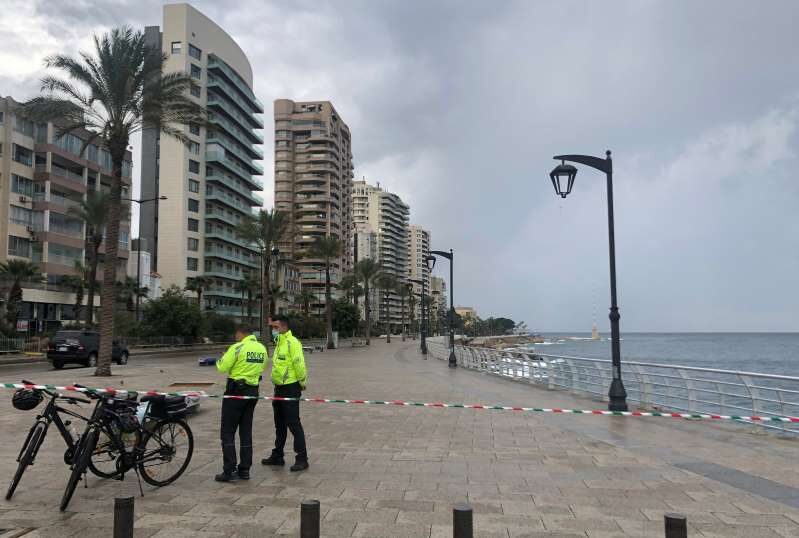Comment: There are numerous 'exceptions' to the rule, but the very concept is totalitarian no matter how you spin it.
Lebanon has extended a hard lockdown by two weeks amid record-breaking numbers of COVID-related deaths and an unabated surge in the number of new cases that have stretched the country's healthcare system to its limits.
Meanwhile, a top health official has announced plans for a roll-out of vaccinations in the crisis-hit country that he said would see some three million of the country's inhabitants - roughly half the population - receive the jab by the end of the year.
Assem Araji, the head of Lebanon's parliamentary health committee, announced that the first batch of doses from United States-based Pfizer would arrive in the first week of February and that priority would be given to healthcare workers and those over the age of 74.
Lebanon has struggled to bring a COVID outbreak under control since the August port explosion that killed 200, injured more than 6,000 and destroyed large parts of Beirut, including several hospitals.
Cases jumped from double figures to hundreds in July and into more than a thousand by late September and have averaged more than 5,000 per day since the beginning of the year with a positivity rate of roughly 20 percent, indicating wide community spread.
The country implemented a nationwide lockdown with an overnight curfew on January 7, allowing for a range of exceptions.
But daily new-case records continued to be broken and an outcry from health professionals led officials to impose a hard lockdown with a 24-hour curfew on January 14.
Originally scheduled to last just 11 days, the lockdown was extended on Thursday until February 8.
Under the strict measures, most businesses and factories must close and even supermarkets and restaurants can only operate via home delivery.
'It's getting bad'
The full lockdown has raised eyebrows in a country struggling with a deep financial crisis that has left more than half the population in poverty, many living hand-to-mouth.
The Lebanese state has promised to provide aid amounting to less than $50 a month to some 280,000 families, but aid groups have said that fails to meet the overwhelming demand for help.
"Every day our charity receives hundreds or thousands of distress calls from all over the country - not only from refugees any more but from Lebanese families," said Fadi Haliso, the co-founder of Basmeh & Zeitooneh, an aid organisation that primarily helps Syrian refugees in Lebanon.
In a video posted to Twitter, Haliso said that "even people coming from very nice neighbourhoods," were asking for "food parcels, for baby formula, for rent support because they haven't been able to pay for moths and are under threat of being evicted".
Araji said the lockdown could be further extended should case numbers remain high.
Firas Abiad, the head of Lebanon's largest hospital providing COVID care, said that lifting or easing the lockdown now "will surely lead to a collapse of the health system and result in more deaths. This is unacceptable and unconscionable."
In the last week, from January 14 to January 21, the daily death record was broken five days out of seven, with 411 dead in total. The week before, the total number was 159.
"It's getting bad," a Beirut intensive care unit (ICU) doctor told Al Jazeera, noting there were no ICU beds left in the capital and even emergency rooms were becoming crowded.
Many hospitals had already announced they would only carry out procedures on non-COVID patients in urgent cases.
"We have to turn patients down ... many are at home using oxygen and on waiting lists until a place opens up, and people are really struggling to find hospitals in their areas," the doctor said, speaking on condition of anonymity due to the sensitivity of the matter.
Vaccine roll-out
With the situation becoming bleaker by the day, many in Lebanon have placed their hopes on the roll-out of a vaccination program that health officials have said will begin in mid-February.
The details of that programme were made clearer by Araji following a meeting on Thursday with the committee that has drawn up the country's vaccination plan.
Lebanon has so far placed orders or is close to placing orders for more than six million doses of vaccines, enough for three million of the country's residents, Araji said; 2.1 million from Pfizer, more than 2.5 million through the World Health Organization's COVAX programme, and a further two million from Astra-Zenica.
The World Bank on Thursday announced it had approved a $34m loan to pay for vaccines for more than two million people in Lebanon.
Araji said that 250,000 doses of the Pfizer vaccine would arrive the first quarter of the year; 350,000 the second quarter; 800,000 the third quarter; and 600,000 the fourth quarter. Vaccines for other sources would also be rolled out during the same time period, but the exact method is not yet clear, he said.
Vaccinations will take place at 35 centres across the country, most at public hospitals but some at private hospitals in Beirut, Araji said, noting they would each have the capacity to vaccinate approximately 2,000 people per day.
He said that people of all nationalities - not just Lebanese must be vaccinated for the plan to work.
Priority will be given to health workers and those over 74, followed by those above 65, and then those above 54, before vaccinations are offered to the rest of the population. Those under 18 would need parental consent, he said.
Lebanon residents would soon be able to register for the vaccination online or via phone, he said, adding it would take "no less than one year" for Lebanon to reach herd immunity, which he said would drastically slow the spread of the disease and allow for life to return to something similar to what it was before the pandemic.
Source: Reuters




It would not be a surprise if some countries/ethnicities get a more shall we say... unique vaccine.